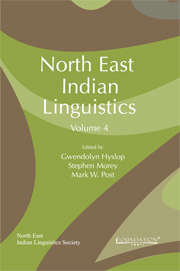Book contents
- Frontmatter
- Contents
- About the Contributors
- Foreword
- A Note from the Editors
- History, Contact and Evolution
- Bodo-Garo Grammar
- Orthography, Poetics and Text
- New Descriptions
- Classifiers
- Eastern Indo-Aryan Grammar
- Personal Pronouns in Madhav Kandali's Ramayana
- 16 Nominalization and the Nominalized Clause in Assamese
- 17 Copula Constructions in Assamese Sadri
- Austroasiatic
Personal Pronouns in Madhav Kandali's Ramayana
from Eastern Indo-Aryan Grammar
Published online by Cambridge University Press: 05 May 2013
- Frontmatter
- Contents
- About the Contributors
- Foreword
- A Note from the Editors
- History, Contact and Evolution
- Bodo-Garo Grammar
- Orthography, Poetics and Text
- New Descriptions
- Classifiers
- Eastern Indo-Aryan Grammar
- Personal Pronouns in Madhav Kandali's Ramayana
- 16 Nominalization and the Nominalized Clause in Assamese
- 17 Copula Constructions in Assamese Sadri
- Austroasiatic
Summary
Introduction
The aim of this study is to provide a morphological and syntactic description of personal pronouns in Madhav Kandali's Ramayana (MKR). Prior to the main discussion on grammatical intricacies to be followed hereon, a brief background of the MKR is in order to authenticate the relevance of this study.
MKR has been attributed to the 14th century, (Sharma 1996; Neog 1985), a period of great significance in the history of the Assamese language, where the first phase of renaissance in religious, cultural and linguistic field was taking place. Around five court poets, including Madhav Kandali, produced Assamese texts during this period. Madhav Kandali translated the entire Sanskrit Ramayana composed by Valmiki into Assamese at the behest of the king Maha-Manikya of Tripura (Medhi 1936: 70). Though Kandali was an accomplished scholar of the Sanskrit language, he did not use the style of Sanskrit in his translation. He wrote it in an easy and simple, yet sublime style to cater to the needs of spiritual leaders to religious enlightenment of the mostly illiterate masses.
It is believed that over the 6th and 7th century, AD, the spoken form of the Assamese language began to develop and spread among the people. It got its written form during the 12th and 13th century, AD (Saikia Borah 1993). The specimen of this period is Carya, written by the Buddhist Siddhacharyas on palm leaves (Tāl pāt), hailing from the different parts of ancient Kamrupa.
- Type
- Chapter
- Information
- North East Indian Linguistics , pp. 317 - 338Publisher: Foundation BooksPrint publication year: 2012

